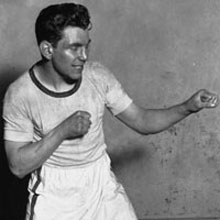1932, Lake Placid, U.S.A.
Ecomonic crisis overshadowed the Winter Games
Last Updated: Friday, December 18, 2009 | 3:26 PM ET
CBC Sports
 General view of the crowd during a Ski Jump event at the 1932 Winter Olympic Games in Lake Placid, USA. (IOC Olympic Museum/Allsport/Getty Images)
General view of the crowd during a Ski Jump event at the 1932 Winter Olympic Games in Lake Placid, USA. (IOC Olympic Museum/Allsport/Getty Images)
Extreme weather hurt the 1932 Lake Placid Games, but it was the economic climate that did the most damage. The Great Depression, the worst economic collapse in the history of the modern industrial world, provided a less-than-ideal setting for an international sports extravaganza.
Hoping the Games would provide a respite from a chaotic, anxious world, the U.S. spent the then-extravagant sum of $750,000 on a new speed-skating stadium, a ski jump, an ice rink and a brand-new bobsleigh run.
The organizers’ best efforts, however, couldn’t undo the effects of the deepening economic crisis. Only 252 competitors — about half the number from 1928 — could attend, with half of these athletes from North America. This diminished the international credibility of the Games. In a sign of the times, all but one of the German athletes had to pay their own way to the Games.
Weather again impacted the Lake Placid Games as it did on the previous two, with the bobsleigh suffering most. A sudden blizzard postponed the two-man event, then a severe thaw turned the course into a big puddle and delayed the four-man race. The event was not completed until two days after the Games had officially closed.
Other glitches included a series of nasty crashes during the bobsledders' training runs and a mapping problem in the cross-country ski races, which sent skiers through a long, deserted stretch of woods with no stewards to point the way and no spectators to cheer them on.
On the bright side, the Lake Placid Games boasted a number of firsts. The Games were opened by then-governor Franklin D. Roosevelt, who would be elected president of the U.S. shortly afterward.
During the Opening Ceremony, British speed skater Mollie Phillips marched her team's flag into the stadium. It was the first time a female athlete had been given the honour.
Norwegian figure skater Sonja Henie made her third Olympic appearance at Lake Placid, to the delight of her legions of fans. Henie, 19, won the second of her three career Olympic gold medals.
Scandinavians dominated most of the Nordic skiing events as they had in the past, but the Norwegians were edged out of first place for the first time in the short history of the Winter Olympics. The U.S. finished first by winning 12 medals while Norwegian athletes won 10.
Canada’s performance
No doubt helped by the depleted numbers of international athletes, Canada finished third in the medal standings, four places higher than it did in the 1928 St. Moritz Games. In Lake Placid, Canadians won one gold, one silver and five bronze.
Canada won its fourth consecutive Olympic gold medal in men’s hockey, but it was no cinch this time. The American squad gave them a run for their money, and the teams wound up deadlocked after a gold-medal game that included three overtime periods. Officials declared Canada the winner because the team had scored more goals in the tournament.
Canadians did well in speed skating, thanks to Alex Hurd, Frank Stack and William Logan, who finished third, fourth and fifth respectively in the 500-metre race. Hurd won the silver in the 1,500, with Logan taking bronze and Stack finishing fourth again. Logan won bronze in the 5,000, and Stack claimed the bronze in the 10,000.
Stack, who was born in 1906, was still competing in speed skating at the Winter Games of 1948 and 1952.
Montgomery (Bud) Wilson of Toronto won the bronze in men's figure skating, earning Canada's first-ever medal in that sport.
Three new demonstration sports — curling, dogsled and women’s speed skating — were introduced at these Games, and Canadians won them all.
In curling, the Manitoba, Ontario and Quebec teams easily secured the first three places, while Manitoba musher Emil St. Godard finished first in the 50-mile dogsled event.
In women's speed skating, Canada's Jean Wilson, who was also the North American indoor speed skating champion, finished first in the 500m event and second in the 1500.
Wilson was awarded a free trip to Japan but never took it. She died the following year of a progressive muscular disease. She was 23.
| Country | Gold | Silver | Bronze | Total |
|---|---|---|---|---|
| 1. USA | 6 | 4 | 2 | 12 |
| 2. Norway | 3 | 4 | 3 | 10 |
| 3. Canada | 1 | 1 | 5 | 7 |
| 4. Sweden | 1 | 2 | 0 | 3 |
| 5. Finland | 1 | 1 | 1 | 3 |









 Eddie Eagan was the only athlete to win gold medals in both the summer and winter olympic games. (Getty Images)
Eddie Eagan was the only athlete to win gold medals in both the summer and winter olympic games. (Getty Images)
